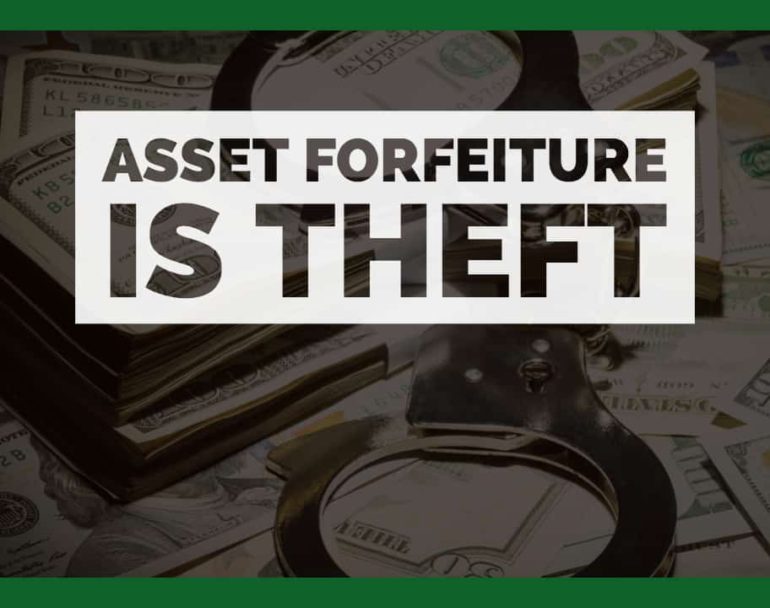
Tennessee Bills Would Effectively End Federal Asset Forfeiture Program in the State
By: Mike Maharrey
NASHVILLE, Tenn. (Feb. 4, 2019) – Bills introduced in the Tennessee legislature would create a process to determine whether there is probable cause before proceeding with asset forfeiture and close a loophole allowing state and local police to circumvent stringent state asset forfeiture laws by passing cases off to the feds.
Rep. Martin Daniel (R-Knoxville) introduced House Bill 340 (HB340) on Jan. 30. Rep. Frank Niceley (R-Strawberry Plains) introduced a companion in the Senate (SB362) on the same day. The legislation would require the district attorney general to review the underlying circumstances of a seizure to determine if probable cause exists to justify forfeiture. If probable cause cannot be established, the district attorney would be required to file a motion to dismiss the application for forfeiture warrant.
Passage of HB340/SB362 would build on reforms signed into law last year by Gov. Bill Haslam.
Under intense law enforcement opposition, the Republican-controlled legislature killed a bill featuring more robust provisions that would have required a conviction before proceeding with forfeiture.
Passage of HB340/SB362 would also take a big step toward closing a loophole that allows state and local police to get around more strict state asset forfeiture laws in a vast majority of situations. This is particularly important in light of a policy directive issued in July 2017 by then-Attorney General Jeff Sessions for the Department of Justice (DOJ).
A federal program known as “Equitable Sharing” allows prosecutors to bypass more stringent state asset forfeiture laws by passing cases off to the federal government through a process known as adoption. The DOJ directive reiterates full support for the equitable sharing program, directs federal law enforcement agencies to aggressively utilize it, and sets the stage to expand it in the future.
Law enforcement agencies can circumvent more strict state forfeiture laws by claiming cases are federal in nature. Under these arrangements, state officials simply hand cases over to a federal agency, participate in the case, and then receive up to 80 percent of the proceeds. However, when states merely withdraw from participation, the federal directive loses its impact.
Until recently, California faced this situation. The state has some of the strongest state-level restrictions on civil asset forfeiture in the country, but state and local police were circumventing the state process by passing cases to the feds. According to a report by the Institute for Justice, Policing for Profit, California ranked as the worst offender of all states in the country between 2000 and 2013. In other words, California law enforcement was passing off a lot of cases to the feds and collecting the loot. The state closed the loophole in 2016.
HB340/SB362 included language that would close the loophole in most situations.
A local or state law enforcement agency, including a judicial district drug task force, shall not refer, transfer, or otherwise relinquish possession of property seized under state law to a federal agency by way of adoption of the seized property or other means by the federal agency for the purpose of the property’s forfeiture under the federal Controlled Substances Act, compiled in 21 U.S.C. § 801 et seq.
A local or state law enforcement agency, including a judicial district drug task force, or participant in a joint task force or other multijurisdictional collaboration with the federal government shall not accept payment of any kind or distribution of forfeiture proceeds resulting from a joint task force or other multijurisdictional collaboration unless the aggregate net equity value of the property and currency seized in a case exceeds one hundred thousand dollars ($100,000), excluding the value of contraband.
Very few cases exceed the $100,000 threshold.
As the Tenth Amendment Center previously reported the federal government inserted itself into the asset forfeiture debate in California. The feds clearly want the policy to continue.
Why?
We can only guess. But perhaps the feds recognize paying state and local police agencies directly in cash for handling their enforcement would reveal their weakness. After all, the federal government would find it nearly impossible to prosecute its unconstitutional “War on Drugs” without state and local assistance. Asset forfeiture “equitable sharing” provides a pipeline the feds use to incentivize state and local police to serve as de facto arms of the federal government by funneling billions of dollars into their budgets.
WHAT’S NEXT
At the time of this report, neither HB340 nor SB362 had been referred to a committee. Once the bills receive committee assignments, they will have to pass their respective committees by a majority vote before moving forward in the legislative process.